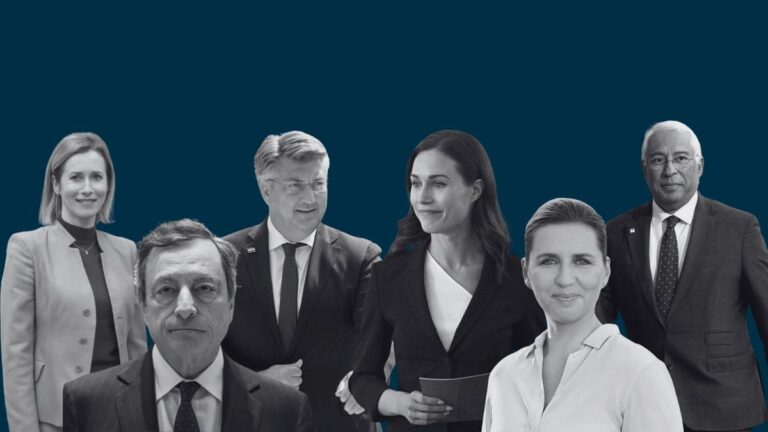The appointment of Charles Michel’s successor will not be a matter of name but rather of which of four main configurations will emerge after this week’s elections.
advertisement
The race for leadership of the European Council – the contest for the honor of guiding EU leaders through the next five years of office – has the peculiarity of being extremely difficult to predict.
The EU’s collection of heads of state and government is an elite club and anyone hoping to chair it must have been there before, so having served as a political head of state is one of the conditions for appointment.
But it also serves as a key balancer for senior EU appointments and provides a counterweight to the selection of the Commission President.
Who will lead the European Council is likely to be determined not by a list of candidates but by a range of post-election scenarios.
Here are four possible post-election scenarios:
The Usual Suspects
If Ursula von der Leyen’s re-election as European Commission president goes ahead as planned, the presidency of the European Council will go to the Socialists.
If this scenario were to play out, the Council chairs would likely be Danish Prime Minister Mette Frederiksen and former Portuguese Prime Minister Antonio Costa.
While Danish public opinion takes Frederiksen’s appointment almost for granted, Portugal sees Costa as its best chance to head the EU since Jose Manuel Barroso left the European Commission a decade ago.
Costa got off to a somewhat slow start after being forced to resign last year following a sudden investigation into a corruption scandal (he has since been exonerated) but he remains highly popular among other EU leaders.
Meanwhile, Frederiksen will be playing cards from inside the casino.
Spain’s Pedro Sanchez was also seen as a possible candidate a few weeks ago when he was on the verge of resigning, but the situation in his country has improved significantly since then, although his name is still being bandied about in Brussels.
A plot twist (as is necessary in any Usual Suspects scenario) could be Sanna Marin, the former prime minister of Finland, the socialist dark horse among EU leaders.
Knives Out
A random scenario in which the Socialists are excluded from power-sharing is not improbable, especially if the majority needed to appoint the Commission is expanded to include far-right parties such as Giorgia Meloni’s Brothers of Italy.
The more experienced EU leaders could prevail in chaotic all-night talks a la “Knives Out,” and French President Emmanuel Macron, who negotiated senior EU posts in 2019, could fine-tune a deal to reappoint another liberal to replace Charles Michel.
Two liberals in particular might be ideal for the post, but each comes with their own caveats.
advertisement
Estonian Prime Minister Kaja Kallas, who is already on the list of candidates for the EU’s High Representative for Foreign Affairs, could suddenly find herself on the list of candidates for the presidency of the European Council in this scenario.
But many consider her to be partisan on the issue of Russia, and the issue may already be damaging her chances of becoming the next NATO secretary-general.
The second choice is Belgian Prime Minister Alexander de Croo, who has been politically active during the Belgian presidency of the Council of the EU. De Croo is not expected to play a major role in national politics after June’s elections and is therefore looking for work.
The problem is that he will be the third Belgian to be appointed to the post after Charles Michel and Herman Van Rompuy, which could raise doubts in many countries, especially in the Eastern Bloc.
advertisement
“Anatomy of a Fall”
For the European People’s Party (EPP), this would be something of a disaster movie scenario: leading the largest group in Parliament yet unable to secure the top post in the EU executive.
Analysis of the EPP’s collapse would see a centre-right party take over at least the presidency of the Council. The most likely candidates in this scenario would be leaders keen to project power on the international stage.
One such candidate is Andrej Plenkovic, Croatia’s prime minister since 2016, who recently weathered a tense election during which his main political rival, the country’s president, Zoran Milanovic, pressured him to step down from national politics to succeed Charles Michel.
Another man looking to escape national politics is Greek Prime Minister Kyriakos Mitsotakis. Finland’s former Prime Minister Alex Stubb is also unlikely to do so, although he has just begun his stint as president of Finland.
advertisement
“A man for all seasons”
As satirical X-account Berlaymonster pointed out, Mario Draghi is literally in every job these days.
The Italian is the proverbial rabbit out of the hat that no one can refuse once his name is on the table, so we expect him to be brought up quite late in the negotiations.
Like Thomas More in Fred Zinnemann’s classic film, he is a man for all seasons and could play any role in the next EU legislative mandate. We know he doesn’t want to be President of the European Council, but if the EU calls, “Super Mario” may have no choice but to respond.
Whether the EU will make that decision remains to be seen. Thomas More was also a learned sage whose advice was sought by kings and those in power, but who ended up suffering a terrible defeat and could not shake his head.
advertisement
Source link

